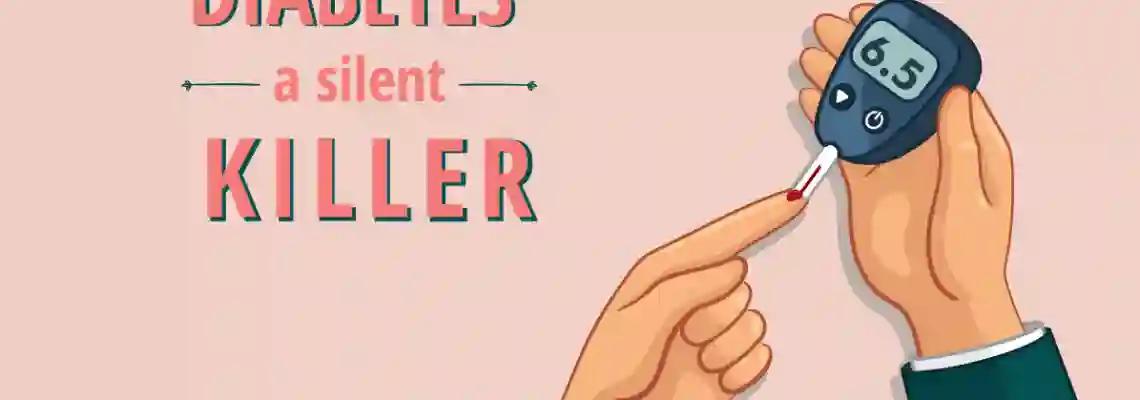- Blogs
- Diabetes-A Silent Killer

Categories :AwarenessHealth Issues
Posted on: 27/09/2023
Diabetes-A Silent Killer
Diabetes is a metabolic hormonal imbalance characterized by high blood glucose, also known as blood sugar level. Insulin is an essential hormone that regulates how the body uses and stores glucose and fat in our body. Diabetes occurs if production of insulin in the pancreas reduces or stops, resulting in cells unavailable to absorb the glucose. As a result glucose starts to accumulate in blood instead of reaching vital organs leading to a state of hyperglycemia (high blood sugar level). Increase in the level of sugar in the blood causes diabetes. If not treated, it can lead to serious complications in the body. Interestingly, its symptoms generally remain undiagnosed for over a long period of time unless the symptoms aggravate, and hence it is also known as a silent killer.
Type 1 diabetes is mostly diagnosed in younger people where as incidence of type 2 diabetes increases with advancing age besides other risk factors like genetics, family history and a sedentary lifestyle. As per research, diabetes is among the leading causes of death in the world.
Symptoms:-
–Excessive thirst and increased urination– Kidneys have to work extra hard to get rid of excessive glucose in the blood, so the person needs to go to the bathroom frequently. Further, excessive thirst means the body is trying to replenish those lost fluids.
–Hunger and fatigue: Cells need insulin to convert the consumed food into glucose for energy. However, if the body doesn’t make enough insulin than it feels that it hasn’t been fed and craves for more of the glucose to function resulting in excessive hunger and fatigue.
–Dry mouth and skin- Excessive peeing often leads to loss of fluids and poor circulation resulting in Itchy or dry skin -warning sign of diabetes.
–Yeast and Infection – Yeast feeds on glucose, so increase in blood sugar level makes it thrive resulting in the body more prone to infections specially in moist areas like fingers and toes, around sex organs, breasts, etc.
–Slow healing of cuts and wounds -Infections, cuts, and bruises that don’t heal quickly are another symptom of diabetes. Overtime, high blood glucose level travelling through veins and arteries results in damage of blood vessels, thereby making it hard for the wound to heal.
Weight loss -When the body is not getting energy from food due to lack of insulin, it will start breaking protein from muscles as an alternative source of fuel. Further, kidneys also have to work extra hard to eliminate excessive blood glucose level resulting in loss of body fluids and weight loss.
-Nausea and Vomiting – While trying to resort to burning fat for energy, the body starts making ketones which can build overtime into dangerous levels, a possible life threatening condition called diabetic ketoacidosis.
Dietary Recommendation
a) A diet rich in high fiber products and less processed foods. Instead of fruits prefer more fruits.
b) Low salt intake as salt accelerates blood pressure thereby increasing the risk of cardiovascular diseases.
c) Balanced intake of carbohydrates, carrots, beans, pumpkin and green leafy vegetables.
d) Apple cider vinegar – as it reduces the blood glucose levels by 40% and improves insulin sensitivity.
e) Cinnamon-Helps lower blood sugar and fight diabetes by imitating insulin effects and increasing glucose transport to cells.
To know more about potential diabetes risk and how to live well with diabetes, make an appointment with us at 9873613111 .With proper treatment and care one can live a healthy life.
